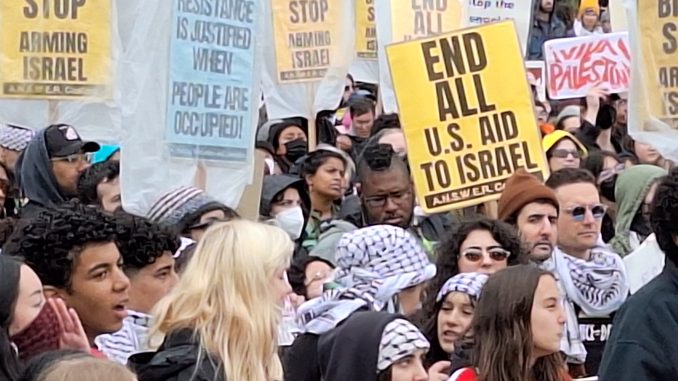
For more than five months since Israel began its military response to Hamas fighters crossing into Israel from Gaza on October 7, there have been almost daily reports of demonstrations, protests, and vigils around the world, including locally, in support of Palestinians and calling for a permanent ceasefire.
These large demonstrations, marches, and vigils expressing opposition to Israel’s actions and the Biden administration’s support for them, have been organized by groups such as Jewish Voice for Peace (JVP), the Council on American-Islamic Relations (CAIR), American Muslims for Palestine (AMP), IfNotNow, the International Jewish Anti-Zionist Network (IJAN), the Interfaith Movement for Human Integrity (IM4HI), and CODEPINK, and they have generated a lot of media attention.
What has been striking at these events has been the almost complete absence of a strong, visible Christian presence, though many Christians have participated in them. There are several reasons for this, as Reverend Allison Tanner, a pastor at Lakeshore Baptist Church in Oakland, and others gave for this reality, including the fear of being labeled antisemitic.
The land occupied by Israel and Palestine is the Holy Land for Christians. Jesus preached a message of peace, so the near-absence of a strong call for a ceasefire from Christian organizations seems ironic. The vast majority of Americans identify as Christian: according to a 2021 Gallup poll, 69% of Americans identify as Christian, while only 2% identify as Jewish, and 1% identify as Muslim. In addition, the U.S. government is financially and militarily supporting what many people consider to be a genocide, with billions of dollars in military aid going to Israel each year.
To date, over 31,000 Palestinians have been killed, and an estimated 70% of those killed are women and children. Israel has bombed entire neighborhoods and hospitals; prevented the passage of desperately needed food, water, and medicines; prohibited international reporters from entering Gaza unless they are embedded in an Israeli unit; and has forcibly displaced almost the entire two million-plus Gazans, who have then often come under fire. Palestinians are now dying of starvation and a lack of access to medical care.
Fear of Being Labeled Antisemitic
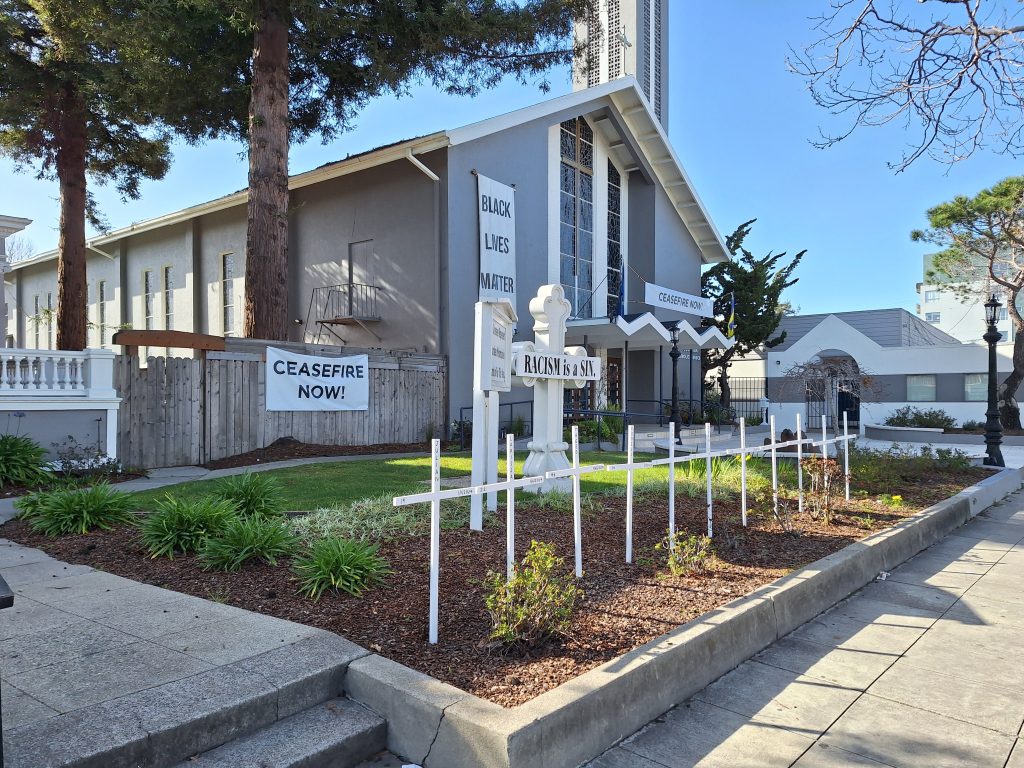
One reason those interviewed gave about why Christian organizations are less visible on the frontlines of pro-Palestinian events is historical Christian antisemitism, which makes people very cautious. For centuries, many Christians blamed Jews for the killing of Jesus, which influenced anti-Jewish sentiments, Naziism, and ultimately led to the Holocaust. Today, Christians are often reluctant to criticize Israel, as it may be seen as being antisemitic.
Reverend Jean Jeffress, a pastor at Plymouth United Church of Christ in Oakland, explained her own initial reluctance to speak up: “Christianity has a terrible history of antisemitism. I was afraid to speak out because I did not want to be viewed as antisemitic. But this military campaign against Gaza does not equal Judaism.” She realized that she had to deal with the discomfort and speak up about Gaza, and in recent months, she has started to do so, in part because a Jewish friend urged her to. She also remarked on how this war is causing divisions in the U.S. When her church raised a “Ceasefire Now!” banner, a man across the street was shouting that it was the wrong message, that a ceasefire message supports terrorism. Jeffress said she and her church members found the situation deeply disturbing.
Many people commented on how several Christian communities in the Bay Area have built relationships with synagogues and they are often unwilling to take a stance that would offend their Jewish colleagues. Therese Mughannam-Walrath, a Palestinian American activist, has encountered this on more than one occasion. For example, she told Oakland Voices that her bishop would not even listen to her concerns about the silence of the local Catholic Church, indicating he had nothing to say other than what the U.S. bishops had on their website concerning Gaza. On an earlier occasion, Zionists complained to a previous local bishop about the Jewish, Christian, and Muslim speakers at a conference that she had helped to organize who, they claimed, had engaged in hate speech. The bishop told her that he agreed with her position on the oppression in Palestine, but he was afraid of the reaction he would get from the local rabbis if he spoke up.
Another reason given was that Christian communities are often busy and involved in other important social justice issues, such as immigration. However, churches often focus on more than one issue. For example, Roberta McLaughlin, a member of St. Columba Church in Oakland, a Black Catholic church, said that her church is working on reducing violent crime in Oakland, the racial wealth gap, and a ceasefire in Gaza. St. Columba Church will be the second leg on an Interfaith Gaza Ceasefire Pilgrimage to be held on Saturday, March 23, which will go from Berkeley, through Oakland, and end in Alameda.
In the case of some Catholic communities, their actions are limited by what their bishops and archbishops will allow. Despite the fact that Pope Francis has called for a ceasefire and has criticized the indiscriminate killing of people in Gaza, many Catholic church leaders do not follow his example. Bill Joyce*, a practicing Catholic, lives in Oakland and says “the Northern California bishops tend to focus on traditional devotional concerns in a dogmatic, pre-Vatican II way, unless issuing statements about politicians not being worthy of communion related to their positions on abortion or contraception.”
An additional influence on the lack of presence of Christian organizations at public events opposing Israel’s actions in Gaza is related to the many thousands of primarily evangelical Christians who are Christian Zionists, who believe that Jews must return to the Holy Land for the second coming of Christ. Four days after the Hamas incursion into Israel on October 7, members of the Southern Baptist Convention posted an “Evangelical Statement in Support of Israel.” The statement supports Israel’s right to use arms and references the Old Testament to support this stance. In late December, The Guardian reported on these rifts in the U.S. Christian community.
Growing Support for Ceasefire Among Christian Leadership
Despite the lack of a concerted response by Christian organizations to what is happening in Gaza, there are some efforts. For example, the national organization, Christians for a Free Palestine, called for a National Day of Action on Monday, March 18. And, although Christian organizations have been absent at the large demonstrations that garner a lot of media coverage, Christian organizations and prominent leaders have issued statements and written letters. For example, in December, Pope Francis referred to Israeli military actions that killed and injured Palestinians in a church in Gaza as “terrorism.”
Christian organizations such as Churches for Middle East Peace (CMEP) have published statements. In October, the U.S Conference of Catholic Bishops issued a call for prayers for peace in the Middle East. On October 20, Palestinian Christian institutions and movements published “A Call for Repentance: An Open Letter from Palestinian Christians to Western Church Leaders and Theologians,” directed at those who uncritically support Israel. In November, Black Christian faith leaders wrote to President Biden, calling for a ceasefire. In November, Friends of Sabeel North America (FOSNA) released a detailed statement demanding an immediate ceasefire in Gaza, and called for signatories. At the end of January, a coalition of over 1,000 Black pastors representing thousands of congregants put pressure on the Biden administration to bring about a ceasefire.
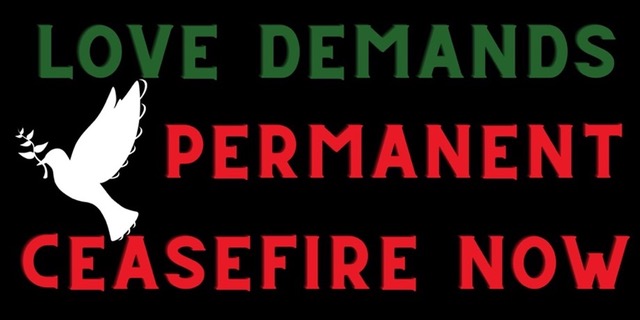
Christians in the Bay Area have also been organizing. For example, on the morning of December 24, 2023, Christmas Eve, about 70 people of all ages and many different ethnicities and faiths gathered outside Lakeshore Baptist Church in Oakland to raise a “Ceasefire Now!” banner on the front of the church.
Reverend Allison Tanner of Oakland led the interfaith ceremony at her church that drew attention to the impending genocide in the narrow Gaza Strip on the eastern Mediterranean. She urged people to take a poster to place in their homes, to make the Christmas message of “Peace on Earth” come true, and to demand a permanent ceasefire, not just a lull in the killing. “Let us work to make it not a wish or a prayer, but a reality,” Tanner said at the Christmas Eve event.
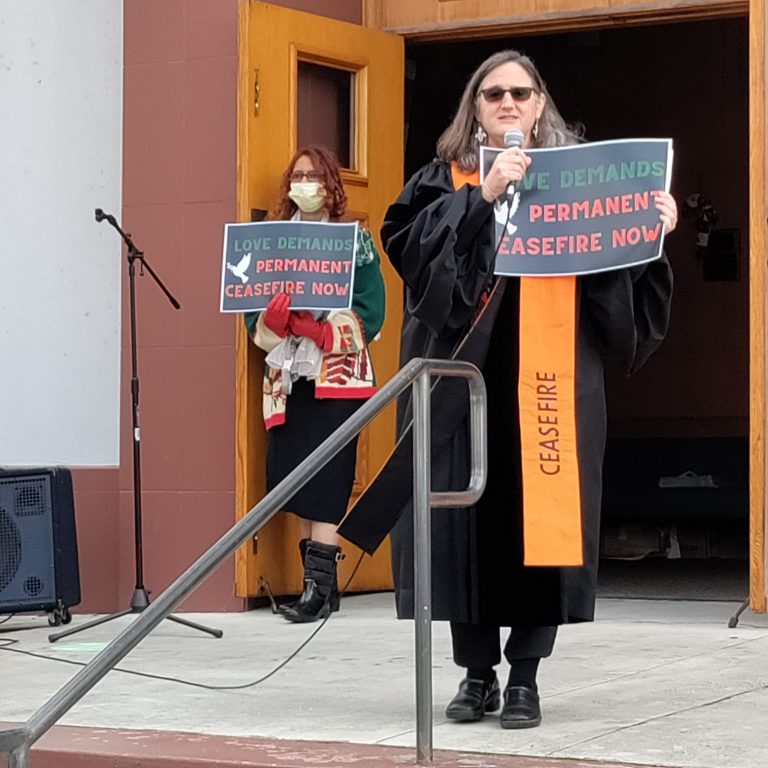
Tanner then referred to the reaction of Christians in Bethlehem, the birthplace of Jesus, to the bombardment and killing of so many Palestinians: “We cannot celebrate Christmas as usual when there is so much death, destruction, and devastation in the land of Jesus’ birth. Not when the faith community in Bethlehem is in deep mourning and has canceled all Christmas festivities.” She continued by referring to the U.S. government’s complicity in Israel’s bombardment of Gaza: “We cannot welcome the birth of the Prince of Peace without challenging the ways our government is actively supporting, funding, and offering political cover for genocide.”
Four weeks later, on January 24, a similar raising of a “Ceasefire Now!” banner occurred at the Plymouth United Church of Christ in Oakland, led by Pastors Jean Jeffress and Marjorie Wilkes Matthews. As in other “Ceasefire Now!” banner-raisings, this one included a call-and-response. For example, when Pastor Matthews said, “Our hearts have been breaking over the horrific violence perpetrated in Israel and Gaza, and as the Israeli bombardment of Gaza approaches 100 days. The violence must stop,” those gathered responded with, “Love demands a permanent ceasefire now.” The raising of “Ceasefire Now!” banners at local churches is one of the few very public responses by Christian communities to the events of October 7, 2023. They continue each weekend.
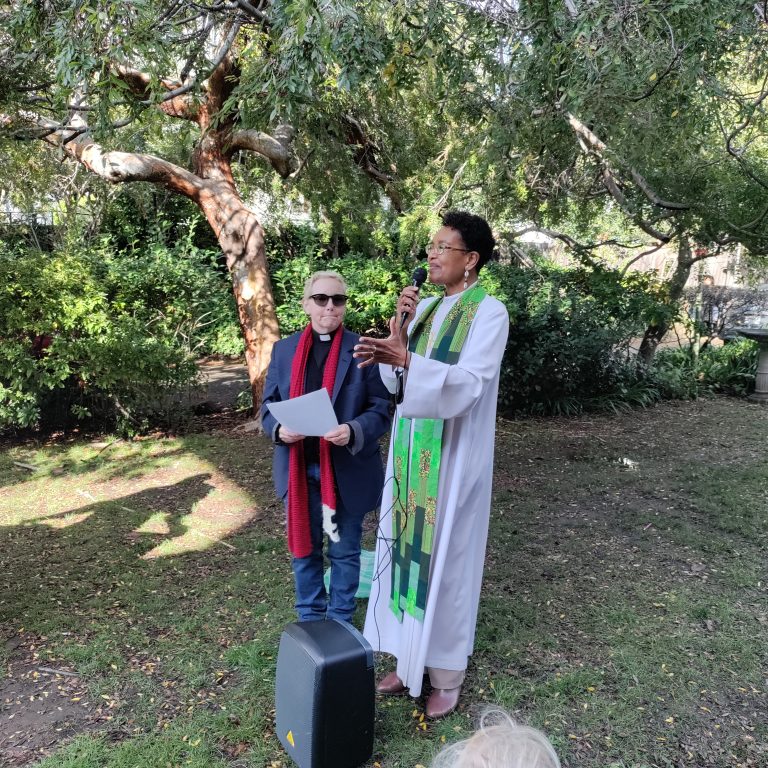
“Christian organizations have a responsibility”
According to Tanner, after a Golden Gate Bridge interfaith action on Dec. 6, a group of Bay Area faith leaders began to strategize how to best utilize their interfaith voices to demand a permanent ceasefire in Gaza. This led to the banner raising that began at churches on Dec. 24, and continues. According to Tanner, 16 houses of worship have raised banners, but many more are interested. However, she pointed out that they have to work through their congregational process, which takes time and education.
Tanner captured what many Christians interviewed shared: “Christian organizations have a responsibility and need to speak out about how genocide is being done in Gaza. Christians have a deep responsibility to do this, through ceasefire banners and public statements. Why? Because Christianity is a dominant religion in the U.S. and has been co-opted to cause great harm through Christian Zionism. Also, the Jewish and Muslim communities in the U.S. are a minority [but they are carrying the load]. It is embarrassing, it’s sickening that Christian organizations cannot do the same.”
Roberta McLaughlin, a parishioner at St. Columba Catholic Church, shared this sentiment and said that she believes that Christian organizations should “raise a hue and cry. It’s horrible. It’s genocide. This has got to stop.”
+ + +
Katharine Davies Samway is a steering committee member of NorCal Sabeel.
*Bill Joyce is an alumnus of Oakland Voices.
Katharine Davies Samway has lived in Oakland for over 35 years. She is a long-term educator — a teacher, a researcher, a teacher educator, a professor of education.

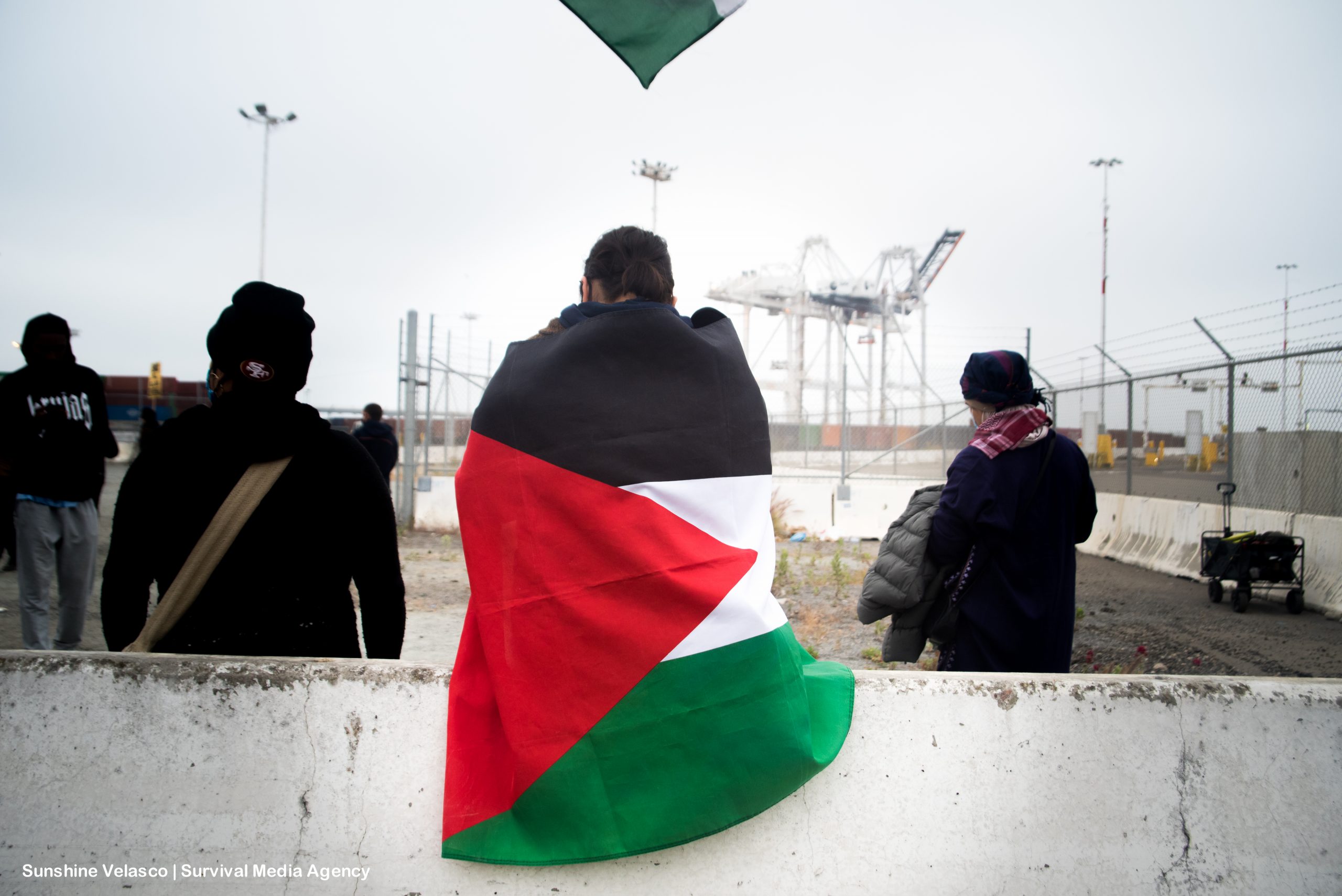
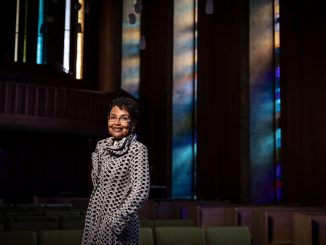
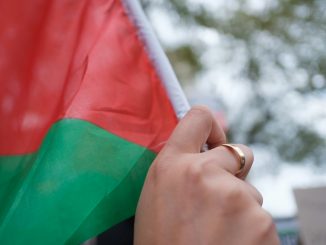
Wonderful, truthful article! Christian churches must head this call to oppose the Genocide of the Palestinian people in Gaza and in all the areas claimed for the exclusive use of Jews by the Zionist Gouvernement in Israel. This is a n evil Holocaust that the USA is fully funding and supporting.
Thanks for this article. I feel overwhelmed by the chorus of voices from every quarter justifying slaughter by claiming that their enemies are “monsters”. Our religious leaders can help end this. We Christians, in particular, need help acknowledging that it is we, the Christian West, who created these “monsters”, and continue to feed them. Stepping into the moral breach by publically assuming our proper share of responsibility would be a very courageous act of non violent resistance indeed.
This is an excellent article on a much needed conversation about the War in Gaza. Many thanks to Katharine Davies Samway for reporting on it and to Oakland Voices.